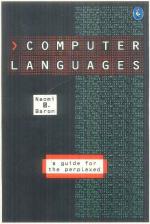
Electron User
 1st March 1989
1st March 1989
Categories: Review: Book
Author: Roland Waddilove
Publisher: Penguin
Machine: Acorn Electron
Published in Electron User 6.06
The Problem Of Language Acquisition
There is quite a plethora of programming languages available for the Electron and its big brother the BBC Micro - Basic, Pascal, Forth, Logo - and it seems that new ones crop up almost every week. After experimenting with Basic, many aspiring programmers look around for something a little better. But with such a wide choice available, which language is best?
This is the dilemma facing many people that this book attempts to dispel. By educating the reader and expanding his knowledge of what is available it enables him to make a much better and wiser choice of software.
After all, a great deal of time and effort must be put into learning a new language, so the task is not to be taken lightly.
The author starts with a discussion of computer languages in general, and examines whether or not they are in fact true languages like English and French. She then moves on to chronicle the growth of computer languages.
Finally, in the first section, she compares the structure of languages and the various methods of classifying them, and looks at the ways in which they handle data.
The major portion of the book deals with a description of 22 different languages. This isn't intended to be a programming tutorial, though there are one or two brief listings. These are used merely to illustrate a particular aspect of the language being discussed.
A fair proportion of the text is devoted to the history of each language, as once you know by whom, for what reason, and where a particular language was developed it becomes much easier to understand why it is so popular - or not so popular - and why it is used for solving a particular type of programming problem.
Did you know, for instance, that Ada was named after Augustra Ada Byron, Countess of Lovelace, and inventor of the stored program? And that is was specifically designed for controlling military hardware?
It is often said that the camel is a horse designed by a committee. Well, Ada is the ultimate computer language, and was designed by the biggest committee of all - the US military - which explains a lot, if you've ever met the language.
APL - A Programming Language would you believe? - must rate as one of the strangest languages around. It is often called a write only language as once you've written a program, you have no chance of reading and understanding it the next day!
There are many more examples I could quote, but that would spoil your enjoyment of the book. If you have an interest in computer languages, or if you simply want to know why structured Pascal programmers sneer at Basic hacks with their spaghetti-like code, then I can recommend this as a good read.
It won't teach you programming, but it will give you the knowledge and understanding to make a better choice of language to learn.
Scores
Acorn Electron Version| Overall | 60% |


